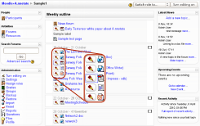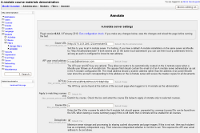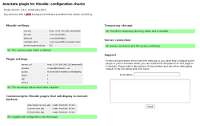Connecting Moodle to A.nnotate for students to read and make notes on course materials and e-books

The A.nnotate Links Moodle plugin adds extra A.nnotate buttons next to the resources (such as documents and images) which are stored in Moodle. The instructor doesn't have to do anything different from usual. It just adds another way for students to access resources. The first time a student clicks the button, the resource is transferred to A.nnotate and the student has an account created automatically where they can read the document and keep their own private notes on it.
The resource is only transferred once, but each user gets an independent private view to keep their own notes.
Features

- Works on PDF documents, office documents, web pages and images. Most document types can be viewed and annotated including spreadsheets and presentations.
- Automatic account creation and login for registered Moodle users. The plugin can be set up so that any registered Moodle user automatically gets an account in A.nnotate. In future, they can log in directly on A.nnotate or via Moodle.
- Comfortable on-screen reading. A.nnotate displays documents page by page without downloading the whole document first, so it is a convenient way to work with long documents such as textbooks.
- Flexible user accounts. Users are not restricted to annotating course materials from Moodle. Once they have an A.nnotate account, they can also add documents of their own and keep all their notes in one place.
Requirements

The standard plugin works with Moodle 1.9. There is a development version available for Moodle 2.0. A.nnotate itself requires a Linux or Windows server with Apache and PHP but can easily be run on a virtual server.
We can also arrange installation on a server operated by a hosting provider of your choice.
Technical
The plugin download area contains full installation instructions as well as developer documentation, release notes and a detailed discussion of how user details and documents are kept secure in the connection between Moodle and A.nnotate. The plugin itself is open source and makes use of the open A.nnotate API.
Technically, the plugin comes in the form of a Moodle filter but it is run on selected pages either through the custom scripts mechanism or by adding a line directly to the php of those pages on which it should operate. It processes HTML content after it has been sent to the browser and adds buttons next to resources linked from the page allowing those resources to be accessed via the A.nnotate server. Resources do not have to be added specifically for A.nnotate: enabling the plugin will enable annotation for existing resources. The configuration settings offer options for fine grained selection of which resources to enable annotation on via file types and course IDs.









